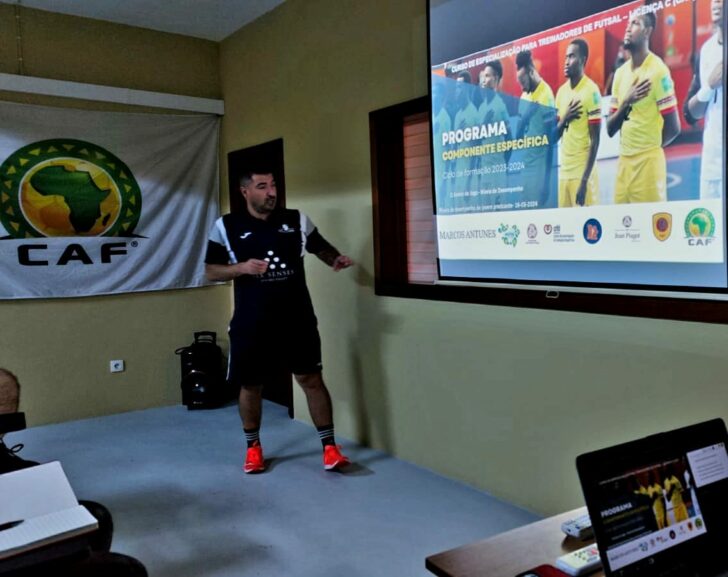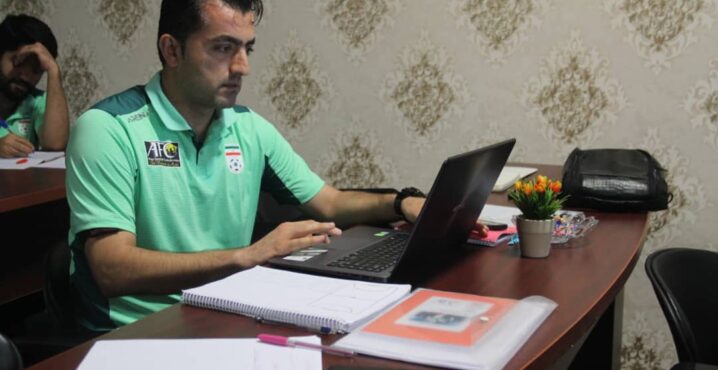Estimated reading time:21 minutes, 1 second
Advancing Futsal: Navigating Coaching Education and Governance
Today, the highest level for Futsal coaching provided in Europe by the Union of European Football Associations (UEFA) is a UEFA B Futsal License. The decision to pursue a UEFA Futsal License is often motivated by professional aspirations. Many seek to become elite Futsal coaches, aiming to operate at the highest echelons of the sport. Others are drawn to roles in education, imparting their expertise to future generations of Futsal players and coaches. Additionally, some aspire to take on leadership positions, overseeing the direction and management of Futsal-related organisations.
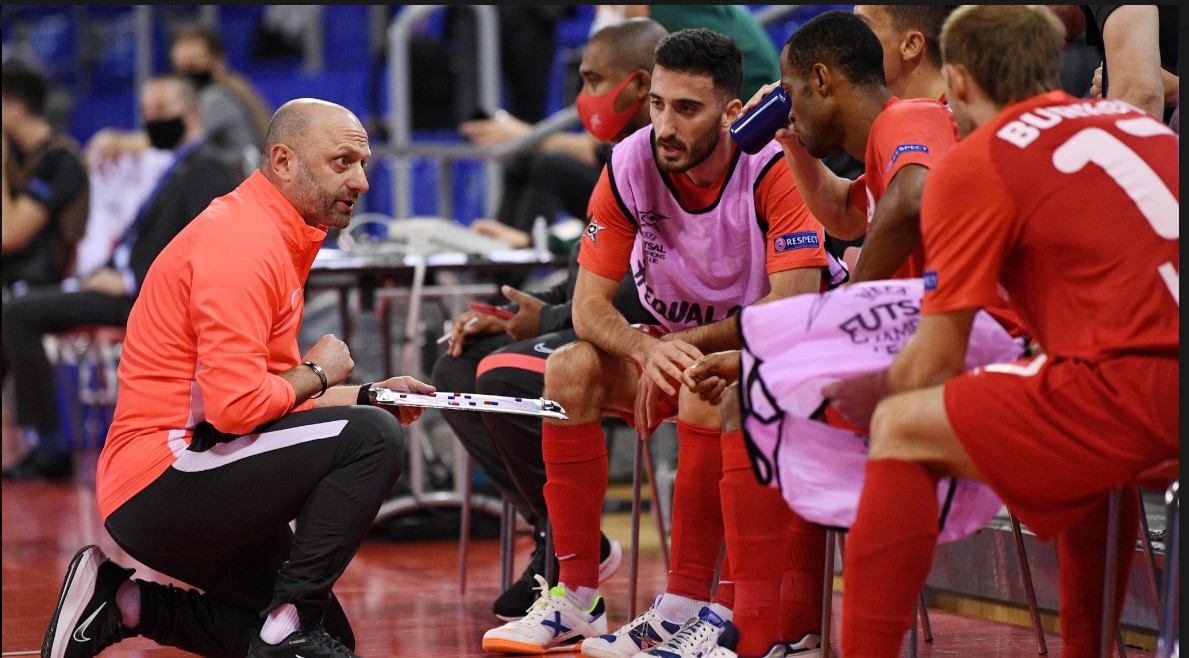
Source: UEFA via Getty Images
The value of a Futsal coaching course extends beyond mere certification. It equips individuals with a comprehensive understanding of Futsal’s intricacies, covering tactical nuances, player development methodologies, sports psychology, and more. Moreover, it fosters a network of like-minded professionals, facilitating collaboration and ongoing learning within the Futsal community.
(Main picture: Angola national futsal coach, Marcos Antunes delivering the first-ever CAF Futsal coaching course called a C License – source Marcos Antunes)
Ultimately, a Futsal coaching course serves as a gateway to unlocking one’s potential within the dynamic realm of Futsal, offering a pathway to professional fulfilment and excellence in the sport. Or does it currently? The answer is nuanced—it depends…
The efficacy of such courses hinge on several factors. Firstly, it relies on the degree to which a governing association prioritises and respects Futsal as a sport. Ambition and strategic plans for Futsal development within the association also play pivotal roles.
However, beyond organisational priorities, the internal dynamics of the association significantly impact the value of coaching courses. If Futsal is subject to internal politics, where personal agendas overshadow the sport’s interests, the effectiveness of coaching education may be compromised. Similarly, if certain cliques within the association exert undue influence or if responsibilities are delegated to an external organisation with conflicting motives, the development of Futsal could suffer as could opportunities for those who should get opportunities but don’t due to ulterior motives.
Reflecting on the challenges faced within national governing bodies, the former Head Coach of the Scotland National Futsal team sheds light on the struggles experienced despite possessing qualifications and expertise. His insights underscore the urgent need for a paradigm shift in prioritising coaching education within the futsal community:
“In the eyes of my national governing body, my existence might as well be inconsequential. Despite my qualifications and experience, I had to pursue further education after leaving my position, as they refused to support it. Shockingly, they’ve yet to enrol their own national futsal team head coach in a coaching course.
My expertise was welcomed abroad, such as delivering for Denmark’s DBU, yet my own governing body won’t even allow me to lead a basic intro to futsal course. It’s not about choosing the best person for the job; it’s about deliberate exclusion and isolation. Clubs and academies claim to engage in ‘futsal’ activities without proper coaches, relying instead on futsal referees during games. Their ignorance persists, viewing futsal as mere indoor football, yet refusing to acknowledge its potential to enhance player development.”
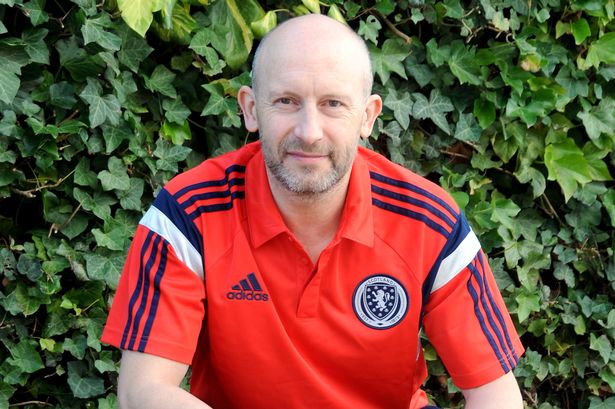
Former Head Coach of the Scotland National Futsal, Mark Potter – source of the image: Scottish FA website
Drawing parallels with successful football development strategies, International Federation of Association Football (FIFA) Coaching Instructor and Haitian National Men’s Futsal Team Head Coach Constantine ‘Cony’ Konstin emphasises the pivotal role of coaching education in enhancing player performance across all levels of futsal. His perspective highlights the potential for global improvement through a concerted effort to raise coaching standards:
“All you have to do is look to Iceland, Iceland improved their football because they emphasised coaching education especially for grassroots. Most coaches in Iceland have minimum of a UEFA B Football License. This too must happen in futsal in Europe and equivalent qualifications throughout the world. Smarter and better prepared coaches will lead to better performances from the players from grassroots to the international stage.”
In essence, while a Futsal coaching course offers knowledge and skills, its true value is contingent upon the broader context in which Futsal operates. A supportive and forward-thinking association, coupled with transparent governance, fosters an environment where coaching education can truly flourish, benefitting coaches, players, and the sport as a whole.
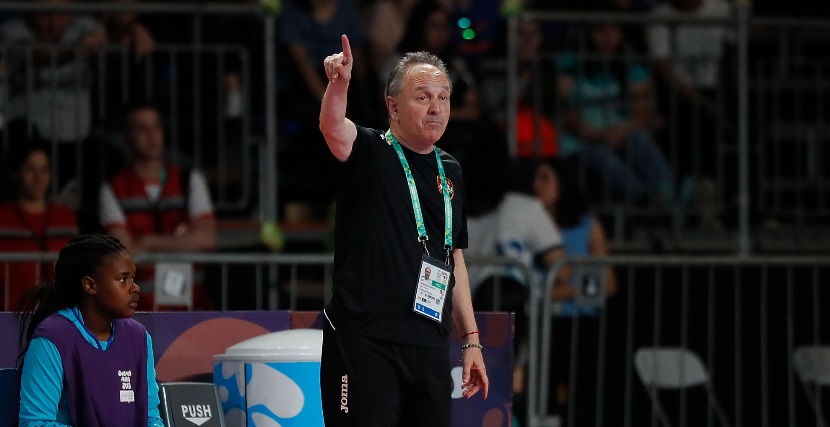
Constantine ‘Cony’ Konstin when he was head coach of the Trindad & Tobago team at the Youth Olympics in Argentina – Source of the image: FIFA via Getty Images
The Role of Governing Bodies
Currently, within the realm of futsal, there are instances where individuals are tasked with leading national futsal teams despite lacking a background in the sport or not possessing the highest level of futsal education recognised by FIFA and its federations. This situation underscores a critical issue that necessitates action from FIFA.
FIFA, as the governing body of world football, holds the responsibility to ensure the quality and professionalism of coaching in all its affiliated sports, including futsal. To address this concern effectively, FIFA must endorse coaching courses delivered through its confederations and mandate stringent requirements for national futsal team coaches.
A pivotal step towards elevating coaching standards in futsal would be for FIFA to stipulate that, following the conclusion of the 2024 FIFA Futsal World Cup, any nation intending to participate in international futsal competitions must appoint a head coach holding at least a UEFA B Futsal License or an equivalent qualification recognised by FIFA. The four-year gap also gives associations the opportunity to start to put in place coaching qualifications if they don’t have them, and if they do but don’t yet have a UEFA B Futsal License equivalent then 4 years should be enough time to create and provide.
By setting this standard, FIFA would not only promote professionalism within the sport but also ensure that national teams are led by coaches equipped with the necessary expertise to drive excellence and development in futsal. This proactive approach aligns with FIFA’s mission to uphold the integrity and growth of the footballing disciplines it develops worldwide such as football/ soccer, beach soccer (along with Beach Soccer Worldwide (BSWW) and futsal.
The Financial Incentive
Enforcing a requirement for futsal coaches to hold a UEFA B license or its equivalent could yield substantial financial benefits for national futsal programs and the broader futsal ecosystem. By mandating qualified coaches at the helm of national futsal teams, FIFA would incentivise governing bodies to invest in futsal coaching education and infrastructure. This investment would not only elevate the professionalism of futsal coaching but also stimulate economic growth within the sport.
Driving Investment and Growth
A key consequence of enforcing coaching standards is the impetus it provides for nations to hire full-time, qualified coaches and allocate resources for futsal coach education. With a qualified head coach leading the national team, there arises a need for a support network of assistant coaches, analysts, and trainers, thereby creating job opportunities within the futsal industry.
Moreover, the emphasis on coaching education could catalyse the development of futsal academies, clubs, and grassroots programmes. As the demand for qualified coaches increases, so too does the need for coaching clinics, seminars, and educational resources. This surge in activity not only fosters a vibrant ecosystem of futsal development but also stimulates ancillary industries such as sports equipment manufacturing, sports science research, and media production.
Expanding the Fan Base and Commercial Opportunities
An influx of qualified coaches into the futsal landscape has the potential to help expand the sport’s fan base and commercial opportunities. With improved coaching standards comes higher-quality gameplay, which could attract a broader audience and increase attendance at futsal events. This growth in popularity could, in turn, attract sponsors, broadcasters, and advertisers eager to capitalise on the burgeoning futsal market.
Furthermore, a well-coached national team competing on the international stage garners attention not only from fans but also from media outlets and sports agencies especially if they are performing better back by an enthusiastic association. Increased media coverage and online engagement further amplify the visibility of futsal, creating additional revenue streams through broadcasting rights, merchandise sales, and sponsorship deals.
Continuing Professional Development in Futsal Coaching
Martin Perciavalle, a seasoned futsal coach, and a Lead Futsal Tutor at the Football Association of Ireland sheds light on the significance of Continuing Professional Development (CPD) hours in enhancing coaching proficiency: “UEFA futsal license holders need to do 15 CPD hours every 3 years to uplift their skills/knowledge to renew their license, otherwise they keep their diploma but not their license.”
However, the implementation of CPD hours varies across different regions. In Spain, for instance, there’s no mandatory requirement for CPD hours, posing challenges for coaches who actively engage in workshops and coaching clinics to fulfil the CPD criteria. Despite their efforts, the lack of formal recognition from the Royal Spanish Football Federation (RFEF) undermines UEFA’s endeavours for coaches to stay updated and informed.
Perciavalle underscores the need for uniformity in CPD standards across confederations: “CPDs are part of coach development and that’s the reason why UEFA is pushing for them.”
Indeed, CPD hours serve as a cornerstone of coach development, fostering a culture of continuous learning and growth. As Perciavalle aptly puts it, “You need to continue to educate yourself, update your knowledge to grow as a coach. Therefore, those CPDs also need to be unified regardless of the confederation.”
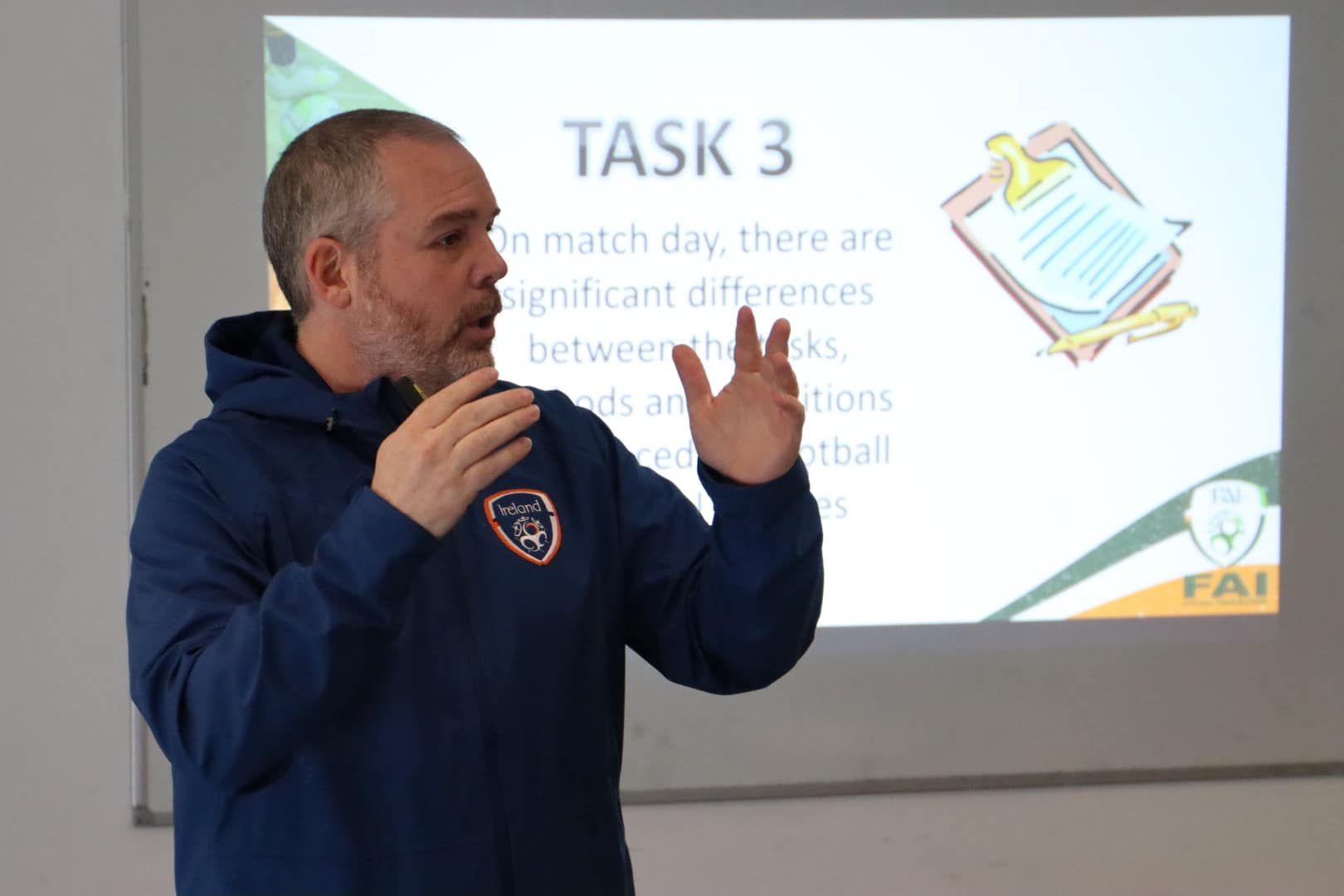
Martin Perciavalle, a seasoned futsal coach, and a Lead Futsal Tutor at the Football Association of Ireland – Source of the image: Martin Perciavalle
The Impact of Ongoing Education on Futsal Development
The emphasis on CPD hours highlights what should be a broader trend within the global futsal coaching community: a commitment to ongoing education and skill development. This dedication not only benefits individual coaches but also has far-reaching implications for the development of futsal as a sport.
By prioritising continuous learning and professional development, coaches are better equipped to adapt to evolving tactics, strategies, and player development methodologies. This, in turn, translates to higher coaching standards, improved player performance, and overall advancement in the quality of futsal at all levels.
Moreover, a unified approach to CPD standards across confederations would foster collaboration and knowledge sharing among coaches from diverse backgrounds and regions. This exchange of ideas and best practices contributes to a richer coaching landscape and accelerates the pace of innovation within the sport.
In essence, ongoing education is not just a personal responsibility for coaches; it’s a collective endeavour that drives the growth and evolution of futsal as a dynamic and respected sport on the global stage.
Challenges in Futsal Coaching Education
Why promote futsal coaching courses domestically to then overlook qualified coaches with UEFA B Futsal Licenses? Futsal opportunities should be rightfully reserved for individuals who have dedicated themselves to the sport. While it’s understandable in developing futsal nations to face a shortage of experienced coaches with UEFA B Futsal Licenses, it’s perplexing to offer coaching positions to former players without the requisite coach education pathway or to football coaches with no futsal background at all.
FIFA ought to establish stringent standards that compel these associations to allocate resources for hiring full-time experienced and qualified futsal coaches. These coaches can not only lead national teams but also play a crucial role in educating developing coaches and fostering the domestic growth of futsal.
Acknowledging exceptions for coaches whose expertise was gained through experience in an era where formal futsal coaching licenses were not as prevalent is fair. However, moving forward, it’s imperative to set clear standards and enforce a pathway for continuous futsal coach education development. Ideally, this progression would lead to UEFA eventually developing a UEFA Futsal A license, signifying a higher level of expertise and professionalism within the coaching ranks.
Offering a firsthand account of the challenges encountered in advancing futsal coaching education, Ryan Jago, Head Coach of the Namibia National Futsal Team, shares his experiences navigating the complexities of coaching development in Namibia. His narrative underscores the importance of proactive measures to promote coaching excellence and drive the growth of futsal on both local and international stages:
“If I hadn’t accepted the Namibian National futsal team head coach position, the nation would have entered the Afcon Qualifier with a coach without a single Futsal Coaching qualification.
Despite their impressive league growth of over 80 teams, essential futsal concepts like Pivot and Fix were initially overlooked. However, the players and coaching team displayed immense passion and eagerness to learn, swiftly adapting to tactical elements such as positions, rotations, and various formations.
Currently, I’m striving to become a tutor to deliver Futsal courses in Namibia, seeking sponsorship to support this endeavour.
While Futsal is hailed as the fastest-growing sport globally, its progression remains limited without prioritising coaching education. In many regions, it’s viewed merely as a variant of indoor football rather than a distinct sport. True growth necessitates a deep understanding of its fundamentals.
My ambition as a coach drives me to pursue higher qualifications, aiming to one day have a UEFA A Futsal license, once they create one, or training in Spain to gain profound insights into Futsal. Alongside coaching the Namibian team, I’m dedicated to mentoring fellow coaches, aspiring to establish a standard where every team in Namibia’s league boasts a minimum understanding of futsal at an FA Level Two level, and guiding them towards obtaining knowledge to a UEFA B Futsal License level.”
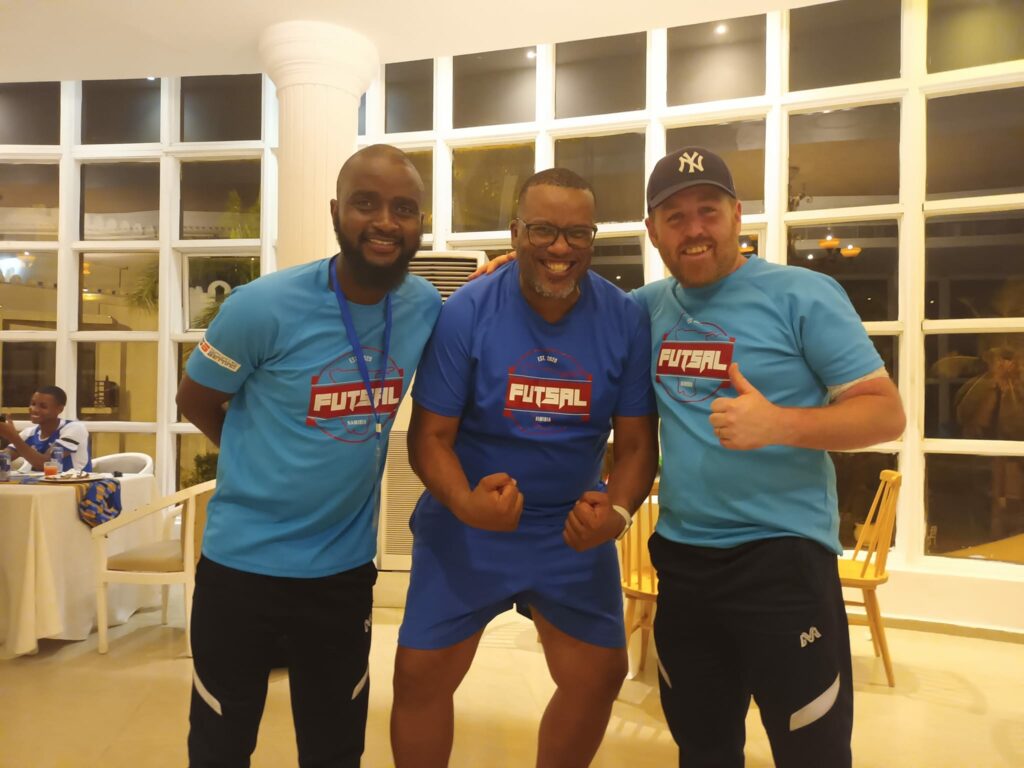
Ryan Jago (right) national futsal team head coach of Namibia – Source of the image: Namibia Futsal via Facebook
Coaching qualifications and recognition
An essential aspect that must be addressed to facilitate the subject of this article is the standardisation and recognition of futsal coach education worldwide. Presently, UEFA B Futsal Licenses are not universally acknowledged beyond Europe (except the South American Football Confederation (CONMEBOL) unless individual associations opt to recognize them.
Conversely, the Asian Football Confederation (AFC) Futsal Level 3 course stands out as an advanced program tailored to cultivate coaching proficiency for top-tier league, national, and international levels, enjoying global recognition. Meanwhile, the Oceania Football Confederation (OFC) provides a comprehensive coaching pathway spanning four levels, culminating in Level C, geared towards national league standards and beyond. The Confederation of African Football (CAF) launched their first-ever coaching license for futsal at the beginning of this month, a Futsal C License course took place in Angola on the 1st of March with 30 coaches taking part.
Expertise was brought together from the Angola Football Association represented by their Futsal Head Coach Marcos Antunes, and University expertise with the inclusion of Professor António Ferraz (Jean Piaget University of Angola) and coordinator of the Futsal C License, and Professor Bruno Travassos, from the Universidade da Beira Interior (Portugal) and one of the leading researches in the world on futsal. Working together they created the course, and all the coaching materials, and it was approved by CAF. The project started 2 years ago with the Angola Futsal Federation, and the Angola Football Federation, who helped to connect all stakeholders with CAF. The goal was to start a research programme, looking for the best standards of futsal training development and athlete performance and enhancement, bringing together both Portuguese and Angola researchers to work on License C which is equal to level 1 at UEFA in CAF. António and Marcos tell Futsal Focus that the course so far has progressed perfectly, and the course will continue until the 1st of June. The aim will be to review the programme, look at the feedback, and hopefully down the line see the course delivered in other African nations. However, as policies stand, the OFC and CAF qualifications will not be recognised beyond their regions unless as mentioned an association within the other confederations chooses to recognise them.
CONCACAF has yet to establish a formal futsal coaching pathway, leaving it largely to individual associations to determine whether they will acknowledge qualifications for national teams, rather than the Confederations taking a proactive stance. Notably, until 2022, CONMEBOL qualifications were not recognized in Europe. However, a significant breakthrough occurred when both confederations signed an Operational Agreement on the Mutual Recognition of Coaching Qualifications and Competences, alongside a Technical Agreement for Coach Development.
Despite these advancements, widespread enforcement of such agreements may prove challenging. For instance, clubs in Brazil may be hesitant to accept a UEFA B Futsal License for coaching their professional teams, and a similar reluctance may exist within national teams. Addressing these discrepancies and fostering mutual recognition across continents is crucial for the harmonious development and recognition of futsal coaching expertise on a global scale. Though, UEFA will likely have to develop an A license soon in order for markets like Brazil to consider giving European coaches any hope of recognition, should they endeavour to work there at a professional level.
Marcos Sorato, a FIFA Futsal World Cup winner with the Brazilian National Futsal Team and the current head coach of the Indonesian National Futsal Team, emphasises the critical importance of qualification and study for futsal coaches. According to Sorato, these elements should be mandatory requirements set by FIFA. He highlights a key issue: the lack of unified courses across different regions, which poses challenges for coaches seeking to work internationally. Sorato’s insights shed light on the complexities faced by coaches navigating diverse certification systems in the global futsal landscape:
“The study and qualifications are fundamental for futsal coaches. It should be a requirement by FIFA, but today the courses are not unified. A coach who takes the CBF course in Brazil, or the CONMEBOL course, until 2022, was not authorised to work in Europe. As long as FIFA does not unify the courses and pass them to federations worldwide, in my opinion, it becomes difficult to demand.”
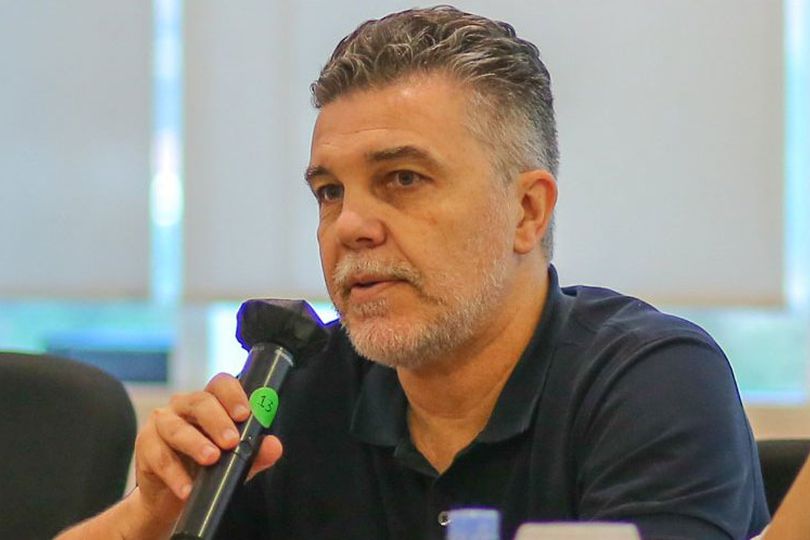
Marcos Sorato, FIFA Futsal World Cup winner with Brazil and now head coach of the Indonesian national futsal team – Source of the image: CBF website
Beyond the challenges faced across confederations, individual associations also encounter distinctions and complications with their counterparts. Take, for example, the case of Spanish Futsal coaching qualifications, which notably surpass UEFA Futsal coaching courses. They offer a Higher Sports Technician in Futsal, an official qualification from the Special Regime Sports Education (EDRE). The Higher-Level Sports Technician corresponds to the Higher Cycle or Level 3 of Futsal that can be taken after completing the Intermediate Degree in Futsal. Despite their advanced nature, these qualifications are not recognised outside of Spain, where a UEFA B Futsal license is deemed necessary.
However, this unique situation presents a dilemma: Spain does not acknowledge anything below a UEFA B license. Consequently, if one were to seek coaching opportunities in Spain, they would be required to reattain subsequent levels of certification, despite possessing qualifications from their home country, on paper, deemed to be equal in stature but unfortunately, would not be considered the case by the RFEF. This presents a formidable obstacle, necessitating the reattainment of certification levels, thereby highlighting the need for greater harmonisation and recognition of coaching qualifications across international borders within the futsal community.
According to our sources, the RFEF has made efforts to negotiate an agreement with UEFA to obtain recognition for their qualifications which could be used/ paving the way for UEFA’s pathway to the professional level. Unfortunately, reaching a consensus has proven to be challenging, and as of now, it remains unattainable.
Success Stories in Futsal Coaching
Some critics of this article may argue that enforcing stringent coaching standards could hinder futsal development in certain regions and countries. However, recent events like Namibia’s performance at this year’s CAF Africa Futsal Cup of Nations demonstrate otherwise. Namibia proactively sought out a coach with a UEFA Futsal B License, Ryan Jago from England, who led their team during the preliminary round qualifiers.
Under Jago’s guidance, Namibia secured their place in the final tournament by defeating Tanzania. Now, they are set to compete in Group B of the final tournament against Egypt, Libya, and Mauritania. This success story highlights how investing in the sport and providing opportunities for educated coaches can yield tangible results on the international stage.
By prioritising qualified coaching personnel, nations can effectively bolster their futsal programs and enhance their competitiveness on a regional and global scale. This approach not only elevates the standard of play but also contributes to the overall growth and development of futsal worldwide.
In navigating the realms of coaching education and governance in futsal, it becomes evident that while significant strides have been made, there are still considerable challenges to overcome. The pursuit of a UEFA Futsal License symbolises not only a personal aspiration but also a commitment to the advancement of the sport. Yet, its true value transcends mere certification, extending to a deeper understanding of futsal’s intricacies and the cultivation of a supportive professional network.
However, the effectiveness of coaching courses is intricately tied to the prioritisation and internal dynamics of governing associations. Without a genuine commitment to futsal’s development and transparent governance, coaching education may falter, hindering opportunities for deserving individuals and impeding the sport’s growth.
The narratives shared by experienced coaches underscore the urgency for a paradigm shift in prioritising coaching education within the futsal community. Their accounts highlight not only the challenges encountered but also the immense potential for growth when coaching standards are elevated.
Looking ahead, the role of governing bodies, particularly FIFA, is paramount. By endorsing futsal coaching courses through mandating stringent requirements for national team coaches to lead nations in their competitions, FIFA can ensure that futsal continues to evolve as a professional and respected sport globally. Moreover, fostering mutual recognition of coaching qualifications across continents is essential for harmonious development and recognition of futsal coaching expertise worldwide.
Ultimately, success stories like Namibia’s journey in the CAF Africa Futsal Cup of Nations underscore the transformative impact of investing in educated coaches. By prioritising qualified coaching personnel, nations can enhance their competitiveness and contribute to the overall growth and development of futsal on both regional and global stages.
In conclusion, the journey to advance futsal is riddled with challenges and unanswered questions, as eloquently expressed by Julio García Mera, a former professional futsal player with an illustrious career with Inter Movistar. Via LinkedIn, reflecting on the sport’s evolution and its positioning in the broader sports landscape, García Mera lamented the lack of Olympic recognition for futsal and the underutilisation of wisdom from retiring champions. He questioned the tendency of adults, particularly those involved in the governance of the sport, to complicate rather than simplify matters, echoing Mr. Magorium’s Wonder Emporium poignant inquiry: “I don’t know why adults stop having faith in what they do… Aren’t they supposed to be smarter?”
García Mera’s introspection sheds light on the need for a fundamental shift in perspective within the futsal community. Instead of perpetuating obstacles and complexities, there’s a call for embracing creativity and simplicity, essential elements that underpin the essence of the sport. His words serve as a reminder that progress often demands a departure from conventional norms and a willingness to challenge entrenched systems.
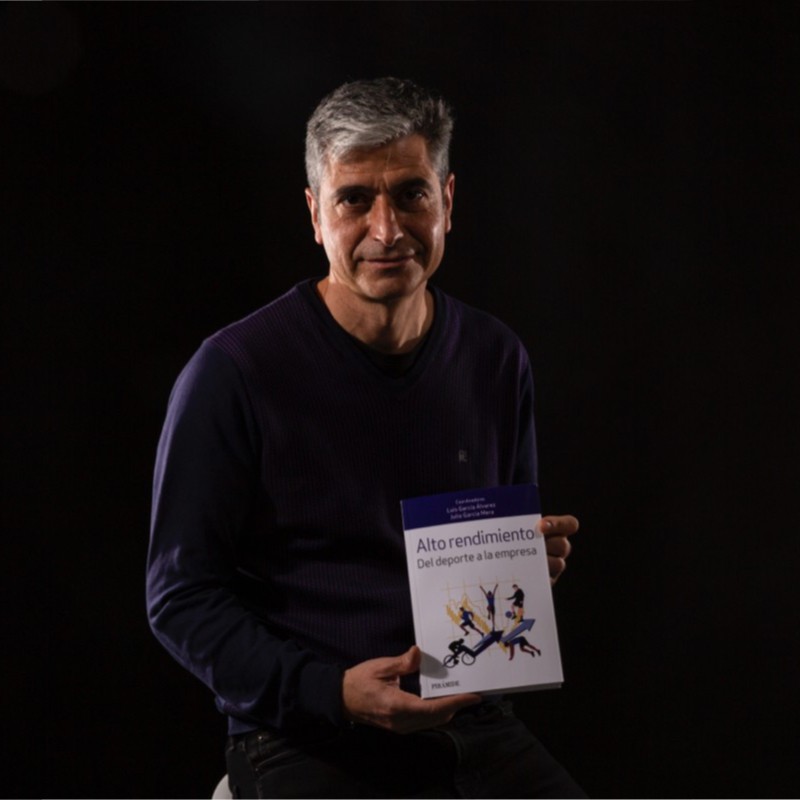
Julio García Mera, a former professional futsal player with an illustrious career with Inter Movistar. Source of the image: Julio García Mera via LinkedIn
As we navigate the realms of coaching education and governance in futsal, García Mera’s sentiment resonates deeply. It underscores the imperative for stakeholders—coaches, governing bodies, and associations—to re-evaluate their approaches, prioritise transparency, and cultivate an environment conducive to growth and innovation.
In essence, the advancement of futsal hinges not only on technical expertise but also on a collective commitment to fostering a culture of inclusion, collaboration, and continuous learning. Only by embracing these principles can futsal realise its full potential as a dynamic and respected sport on the global stage.
Despite reaching out to FIFA for comment, no response was received regarding this article.
The author of the article
Stephen McGettigan was born in the Republic of Ireland but grew up in Belfast. He is the founder of Futsal Focus, a Football Industries MBA graduate from the University of Liverpool Management School, and he has worked in the Football and Futsal industries for 15 years.
Organ Donation
Futsal Focus is a supporter of Dáithí Mac Gabhann and his family’s campaign to raise awareness of Organ Donation. We encourage our readers to learn more about Organ Donation: https://www.organdonation.nhs.uk/
Futsal Focus
You can read more articles about International futsal by going to the top navigation bar or by clicking here
If you like this article and would like to keep updated on Futsal news, developments, etc then you can now follow Futsal Focus via Google News by following our page which will send you an alert as soon as we publish an article so please click here and follow us on Google.
You can also keep updated on Futsal news, developments, etc then please submit your email below in the Subscribe to Futsal Focus option.
Follow Futsal Focus by clicking on Facebook, Twitter, or Instagram or on the social media buttons on the website.



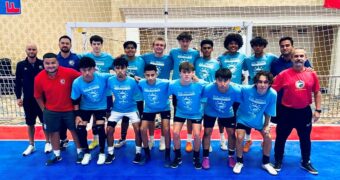



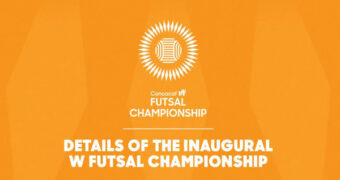
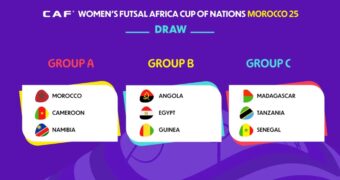
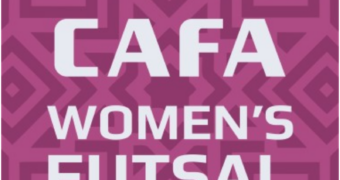




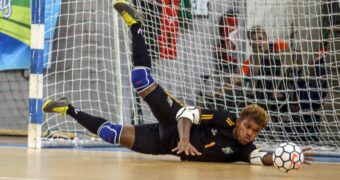

![Validate my RSS feed [Valid RSS]](https://www.futsalfocus.net/wp-content/uploads/2020/01/valid-rss-rogers.png)

